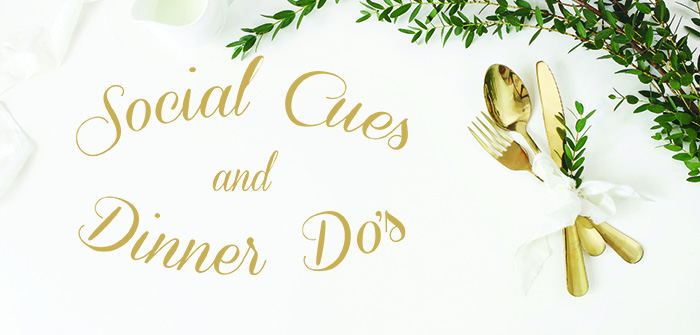story by Liesel Schmidt
Look around you at the world, and you’ll quickly see that we’ve reached great advancements in many areas of life. We drive cars that practically control themselves, have mobile devices that can do everything from making calls (via voice or video) to surfing the Internet, even have homes that can order groceries for us and keep us fully functional by reminding us of appointments. We’ve gained so much through these advancements, but we’ve also lost something extremely important: our understanding of social graces and etiquette, especially when it comes to dining out.
Step into any eating establishment and you’ll see it in an instant: tables full of people staring at their phones rather than looking one another in the eye; dining companions who meet for a meal, but seem to have no respect for actually dining together, at the same time; people taking calls while everyone else has to listen to their one-sided conversation. You’ve probably even seen people a time or two sitting at tables while one (or more) of them sports a pair of noise cancelling headphones.
Where have all the manners gone?
We have classes and courses for everything, teaching us how to do anything from coding apps to fixing leaks in the plumbing all on our own. But where’s the instruction on how to actually navigate in normal society, to show the respect for one another that we all deserve—especially in such an intimate setting as meal time. Breaking bread is supposed to be a time when everything else stops, when one-on-one interaction happens and conversations flow. Historically, it has been. But now the rules seem to have changed…Or have they?
The answer to that is summed up in a simple word: NO. The rules haven’t changed, they just have to be adapted to meet the new ways of the world and fit the various situations in which we find ourselves. Etiquette has and always will be a hallmark of character, an example of the regard to hold for the people in your presence. So while you might think that placing the phone on the table isn’t that big a deal, it may be time to revisit some of the rules and learn some new ones.
When it comes to the aforementioned phone on the table situation, well…Let’s just say that there’s no grey area. Always, always, keep your phone, keys, purse, and any other belongings off of the table. And don’t even think about taking your phone out to send or respond to a text. To do so would basically be communicating to your company that whoever you’re texting is more important to you than they are. Texting or emailing of any kind can wait until dinner is over. In the case of something urgent, however, it is acceptable to take out your phone—just excuse yourself first.

It’s an important rule to uphold in casual social situations, but especially so in business ones. “Media use at the table is a big no-no, and even more so when you are the job candidate,” says Chris Horak, owner of Navigating Convention and Other Social Interaction and a long-time etiquette expert whose background includes everything from serving as butler and household manager to being a chef and museum curator. As diverse as his careers have been, one thing holds true for them all: each of them require the deft use of social skills and decorum. “The same rule of media use is also true for the interviewer. Do you really want to work for or with someone who is constantly taking calls? Will they be available to back you up when you need them, when you work for their organization?” he poses. “Is the person in front of them not of more value to them? By taking these calls at a predetermined meeting, it tells you that they may not be as organized as they were trying to tell you during your time with them.” And if you’re the guilty party pulling out the phone, reverse those questions on yourself. That’s the message you’re sending, even though you might not actually be tapping out the words on that smart little device of yours and sending them. Message received, loud and clear.
 Paying the check is another hot-button issue when it comes to the rules of dinner etiquette. “Each situation decides for itself,” Horak says. “Business, social, friends, colleagues—the list goes on. If you are setting up a business meal, you are responsible for the check. Business people who set up meal appointments are encouraged to hand a form of payment, with instructions to the waiter, before their guests arrive. No need for jostling or embarrassing moments at the end of the meal,” he continues. “In the case of long-standing social relationships, the parties involved should agree upon the check distribution before they set out for the event. Life is much easier when everyone knows the rules and what to expect.” Not only will it save you from embarrassing situations, it can also save relationships from souring over one person always being stuck with the check or an uneven division of the tab.
Paying the check is another hot-button issue when it comes to the rules of dinner etiquette. “Each situation decides for itself,” Horak says. “Business, social, friends, colleagues—the list goes on. If you are setting up a business meal, you are responsible for the check. Business people who set up meal appointments are encouraged to hand a form of payment, with instructions to the waiter, before their guests arrive. No need for jostling or embarrassing moments at the end of the meal,” he continues. “In the case of long-standing social relationships, the parties involved should agree upon the check distribution before they set out for the event. Life is much easier when everyone knows the rules and what to expect.” Not only will it save you from embarrassing situations, it can also save relationships from souring over one person always being stuck with the check or an uneven division of the tab.
Also do everyone the courtesy of waiting to begin eating until the entire table has been served. In the situation of fast-casual, where you’re meeting others and have to order food at a counter, do the same. Don’t order until everyone has arrived, and wait until all meals are on the table. After all, you’re there to break bread together—as in, at the same time.
Also remember to treat the staff with respect. They’re not your servants, so don’t treat them as such. Get their attention when you need them by trying to make eye contact or quietly signaling to them. If something is wrong with your meal, address the situation in a calm, respectful manner and watch your tone. You’ll get better service and show the rest of your companions what a class act you are.
“Good manners are always appreciated by everyone,” Horak advises. “It’s not a wealth thing or a status thing. Treating others with the same respect that one would like to be treated will remain a constant, no matter how much the world changes. No one wants to be ignored or made to feel lesser, so be sure that your behavior does not give them reason to.”
Wise words, to be sure—and a definitely one that’ll earn you more than a few ‘Likes’ in a place more important than social media.

